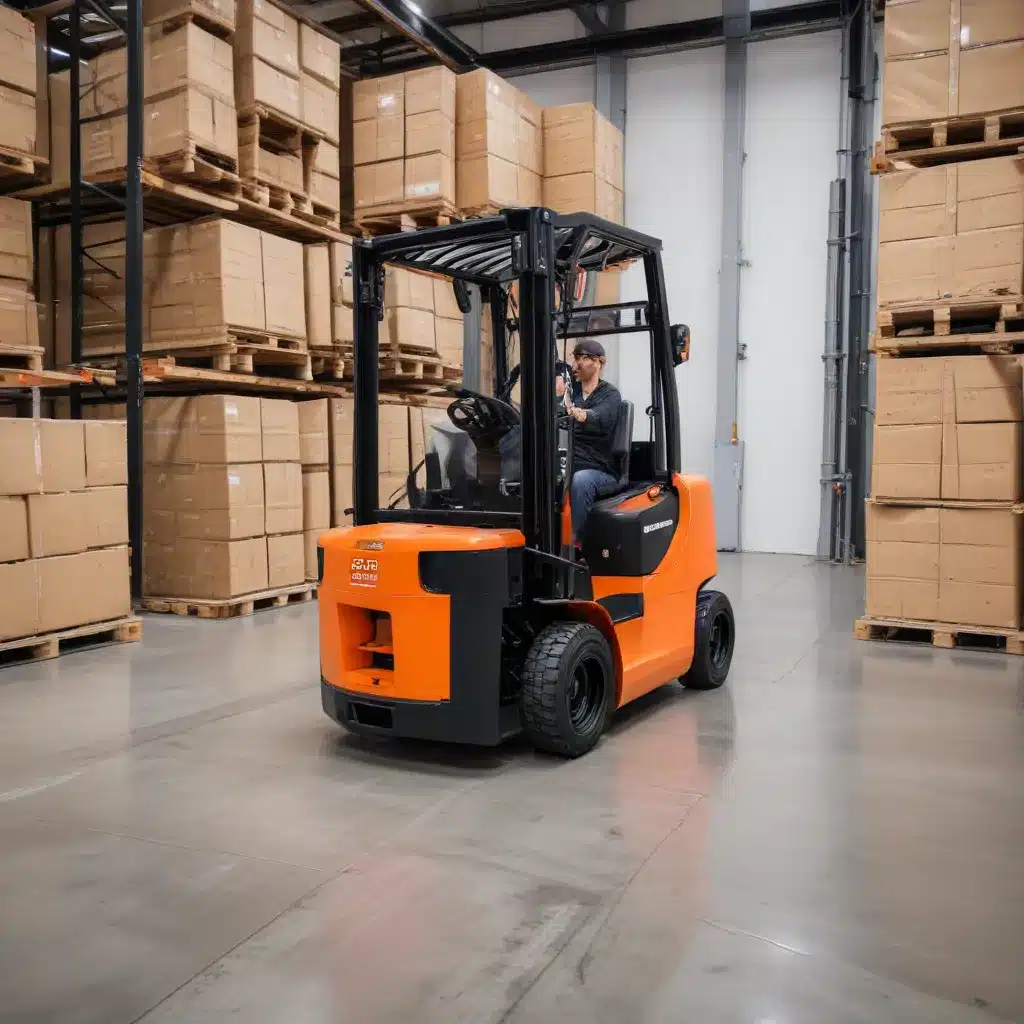
The Rise of the Electric Forklift Revolution
In the dynamic world of logistics and material handling, the humble forklift has long been the unsung workhorse, quietly powering the flow of goods and materials across warehouses, distribution centers, and manufacturing plants. However, a transformative shift is underway, as the industry embraces a new generation of forklifts powered by clean, efficient electric technology.
These electric forklifts are poised to redefine the landscape of modern logistics, promising unparalleled performance, environmental sustainability, and cost-saving benefits. As businesses strive to streamline operations and reduce their carbon footprint, the electric forklift has emerged as a game-changing solution, paving the way for a more sustainable future.
Harnessing the Power of Electric Technology
At the heart of the electric forklift revolution lies an innovative power source: the lithium-ion battery. Unlike their fossil fuel-powered counterparts, these forklifts draw their energy from rechargeable battery packs, eliminating the need for harmful emissions and noisy internal combustion engines.
The seamless integration of electric technology with forklift design has resulted in a host of benefits that are transforming the industry. These include:
Superior Energy Efficiency: Electric forklifts boast remarkable energy efficiency, converting up to 90% of their battery power into usable mechanical energy. This translates to lower operational costs and a reduced environmental impact compared to traditional internal combustion models.
Zero Direct Emissions: With no tailpipe emissions, electric forklifts contribute to cleaner, healthier work environments, aligning with the growing demand for sustainable logistics operations. This aligns with the increasing focus on environmental, social, and governance (ESG) initiatives across industries.
Quieter Operation: The near-silent operation of electric forklifts enhances worker safety and comfort, reducing noise pollution in busy warehouses and distribution centers. This improved acoustic experience can also contribute to increased employee productivity and well-being.
Reduced Maintenance Requirements: Electric forklifts have fewer moving parts and do not require the regular maintenance associated with internal combustion engines, such as oil changes and tune-ups. This translates to lower overall operating costs and increased uptime for logistics operations.
Unlocking Sustainability in Logistics
The rise of electric forklifts is intrinsically linked to the broader push towards sustainability within the logistics industry. As businesses strive to reduce their carbon footprint and align with environmental regulations, the adoption of these clean-powered machines has become a strategic imperative.
Lululemon’s 2022 Impact Report highlights the company’s commitment to sustainability, with a goal of 100% renewable electricity for owned and operated facilities by 2030. The integration of electric forklifts is a crucial component of this ambitious initiative, enabling Lululemon to optimize material handling operations while minimizing its environmental impact.
Similarly, EnerSys, a leading manufacturer of industrial batteries and chargers, has recognized the transformative potential of electric forklifts. The company’s sustainability report emphasizes the importance of developing innovative energy storage solutions to support the transition to cleaner, more efficient material handling systems.
Overcoming Challenges and Driving Innovation
The widespread adoption of electric forklifts is not without its challenges, but industry innovators are rising to the occasion, paving the way for a sustainable future.
Infrastructure and Charging Solutions: One of the primary hurdles is the need for robust charging infrastructure to support the growing fleet of electric forklifts. Businesses must invest in installing reliable charging stations and exploring innovative solutions, such as battery swapping, to ensure seamless operations.
Upfront Costs: While the long-term operational and maintenance savings of electric forklifts are well-documented, the initial capital investment can be a barrier for some organizations. However, as technology advances and economies of scale take hold, the cost differential between electric and internal combustion forklifts is expected to diminish.
Operator Adaptation: Transitioning from traditional forklifts to electric models may require adjustments in operator training and familiarity. Effective change management and comprehensive training programs are crucial to ensuring a smooth transition and maximizing the benefits of electric forklifts.
Despite these challenges, the industry is embracing innovative solutions and strategies to drive the widespread adoption of electric forklifts. According to a report by Boston Consulting Group, the “factory of the future” will increasingly rely on advanced logistics systems, including electric material handling equipment, to optimize efficiency and sustainability.
The Future of Logistics: A Greener, More Efficient Landscape
As the logistics industry continues to evolve, the electric forklift stands as a shining example of how technological advancements can power a more sustainable and efficient future. By reducing emissions, lowering operating costs, and enhancing worker safety and comfort, these innovative machines are poised to redefine the very foundation of modern material handling.
Businesses that embrace electric forklifts not only demonstrate their commitment to environmental responsibility but also position themselves for long-term success. By aligning their operations with the growing demand for sustainable logistics solutions, they can gain a competitive edge, attract environmentally conscious customers, and contribute to the broader societal shift towards a greener, more resilient economic landscape.
The journey towards a fully electrified logistics sector may still have its challenges, but the promise of a cleaner, more efficient future powered by electric forklifts is undeniable. As industry leaders and policymakers collaborate to address the remaining barriers, the stage is set for the electric forklift revolution to accelerate, transforming the way we move goods and materials across the global supply chain.
Visit Forklift Reviews to explore the latest advancements in electric forklift technology and discover how these innovative machines can power your logistics operations towards a sustainable and prosperous future.

